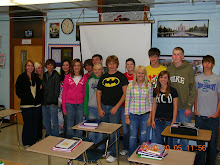Who doesn't love them? There is something mythical and magical about getting a phone call or seeing on the news that we will not have school. Believe it or not, teachers like them too!
Hopefully you all have had a very warm holiday season and are off to a great New Year! I haven't updated this site in quite some time: engaged life will do that to ya!
In Class:
We hit the ground running earlier this week but as you can see, we are at a standstill until Monday. I have been in contact with the Livingston County War Museum regarding our field trip on Thursday 1/14, as well as tying up a few other loose ends. Here's what next week will look like (weather pending):
US History II: Nazism, Pearl Harbor and why it happened, War in the Pacific, and a host of other fascinating topics. Students have enjoyed our WWII unit so far and I hope this keeps up!
US History I: Does the Electoral College accurately represent America's votes for President? Should it be changed? Why or why not? An in-depth study of the EC, as well as continued focus on the Executive Branch, will dominate this week's studies.
World Geography: Leprechauns, luck of the Irish, Stonehenge, Riding of the Bulls, and much more is in store for my World Geography students. It's all part of our unit on Europe; this week focuses on much of Western Europe before making our way east!
Sociology: We will have a live talk show on Monday and invite the founders of Sociology to speak about how they see the social world! Special guests like Max Weber, Karl Marx, Emile Durkheim, Herbert Spencer, and Auguste Comte will "appear" and present their views.
Have a great weekend and see you soon!!
Out of field thinking
2 days ago

A wealth of information about the historic and current Electoral College system, and how it can be changed to guarantee the presidency to the candidate who receives the most popular votes in all 50 states, can be found at
ReplyDeletehttp://www.NationalPopularVote.com
The current system does not reliably reflect the nationwide popular vote. The 48 statewide winner-take-all rules make it possible for a candidate to win the Presidency without winning the most popular votes nationwide. This has occurred in one of every 14 presidential elections.
In the past six decades, there have been six presidential elections in which a shift of a relatively small number of votes in one or two states would have elected (and, of course, in 2000, did elect) a presidential candidate who lost the popular vote nationwide.
Nationwide popular election of the President is the only system that makes all states competitive, guarantees that the candidate with the most popular votes nationwide wins the Presidency, and makes every vote equal.
The National Popular Vote bill would guarantee the Presidency to the candidate who receives the most popular votes in all 50 states (and DC).
Every vote would be politically relevant and equal in presidential elections.
The bill would take effect only when enacted, in identical form, by states possessing a majority of the electoral votes--that is, enough electoral votes to elect a President (270 of 538). When the bill comes into effect, all the electoral votes from those states would be awarded to the presidential candidate who receives the most popular votes in all 50 states (and DC).
The National Popular Vote bill has passed 29 state legislative chambers, including one house in Arkansas, Connecticut, Delaware, Maine, Michigan, Nevada, New Mexico, North Carolina, and Oregon, and both houses in California, Colorado, Hawaii, Illinois, New Jersey, Maryland, Massachusetts, Rhode Island, Vermont, and Washington. The bill has been enacted by Hawaii, Illinois, New Jersey, Maryland, and Washington. These five states possess 61 electoral votes -- 23% of the 270 necessary to bring the law into effect.
See http://www.NationalPopularVote.com